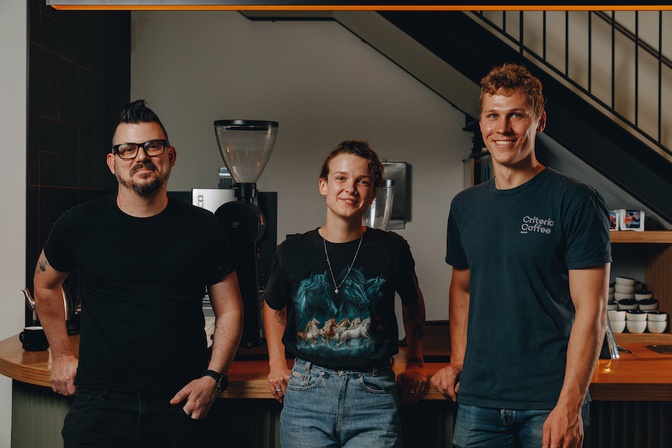We chat to a qualified coffee expert to unpack what it means to be Q-Grade certified – and why it matters.

Craig Simon (left) with Criteria Coffee staff Erin Doidge and Freddie Kjaerulff-Schmidt
Melbourne is internationally renowned for its cafe scene and coffee quality – and that quality has been driven by a demand from locals and tourists seeking a top-notch experience with every cup. But delivering a great coffee consistently takes more than just repetition.
For every great coffee company in Australia, there’s a chance that somewhere behind-the-scenes there’s a certified Q-Arabica Grader pulling the strings. Q-Graders are to coffee what master sommeliers are to wine.
Craig Simon is one of 140 certified Q-Graders in Australia and was one of the first people in the country to obtain the qualification. Simon has worked in the coffee industry for almost 20 years and currently runs Criteria Coffee – a ‘co-roasting space’ in Port Melbourne.
Certified Q-Graders are trained by the Coffee Quality Institute in the sensory evaluation of green (unroasted) coffee, ensuring industry standards are aligned globally. The qualification ensures that there are consistent practices and high standards across tasting, evaluating and scoring the quality of coffee beans.
Simon sat his Q-Grade accreditation exam in 2011 with some of Melbourne’s most experienced coffee names today. Proud Mary founder Nolan Hirte, Market Lane’s Fleur Studd and Disciple Roasters’ Marwin Shaw were all among the first group of graduates.
“It was the first class that was ever taught in Australia. Now there are around 5,000 [graders] in the world, it’s grown quite a bit,” Simon says.
During an intense six-day course, participants learn international standards of identifying specific aspects of coffee and communicating those aspects to other Graders. By the end of the course, successful graduates can identify coffee based not only on taste, but on smell – and even sight, when it comes to beans.
Q-Graders are responsible for providing objective feedback to producers and farmers on the quality of coffee and how their coffee is scored. Simon says this is important because a coffee’s score directly influences how much growers can sell it for.
“Quality has a direct influence over market price. Specialty coffee sells for a higher price, which is where the quality adjudication of it becomes so important. What we are trying to do is determine if the coffee is commercial quality or specialty coffee,” he says. “Any coffee that scores over 80 becomes specialty coffee.”
Coffee is graded on attributes such as aroma, fragrance, flavour, aftertaste, acidity and body balance. Q-Graders also decide whether coffee beans are defective or not defective. Defects can include insect damage, fungus damage, foreign matter or sourness that comes from overripe berries.
Australia is known for its coffee quality, and our Q-Grade numbers back it up. For context, Italy and France are known to serve high quality coffee and have 51 and 18 Q-Graders respectively, compared to Australia’s 140.
In 2017, Simon became a certified Q-Instructor, meaning he’s qualified to teach Q-Grade courses. He’s since taught 26 classes across Australia, New Zealand and Mexico – and he’s heading to Dubai to teach a course next.
“Teaching others worldwide helps make this an accessible qualification. It ensures all graders can speak the same language and are able to communicate about coffee” Simon says. “I could taste this coffee in Melbourne and then have a conversation with a producer in Colombia where we both understand the same nuances.”
Simon’s desire to teach extends into running Criteria Coffee, where he regularly hosts classes and demonstrations for aspiring roasters.
“One of the missions I have for my business is to provide a place where people can learn the skills I’ve learnt over 15 years, take those and put them into practice for their own business,” Simon says. “People can use this space to learn in an inclusive, creative and safe environment and hopefully avoid some mistakes I made along the way.”
Photography: Jake Roden



